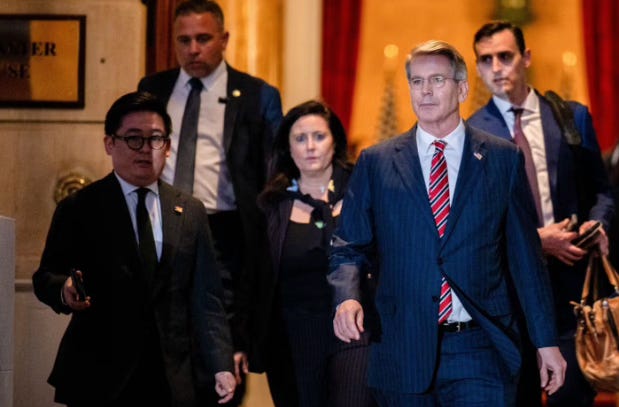Weak China Trade Deal After Talks in London, a Return to Step One for Trump
In the Middle East, US calls back personnel, military families ahead of potential Israeli strike on Iran.
US and Chinese officials struck a handshake agreement in London to revive a troubled trade truce between Washington and Beijing that, despite claims of a win by Trump officials, looks like a win for China.
US Treasury Secretary Scott Bessent, appearing before Congress after returning from London on 11 June, hailed ‘successful negotiations … that will not only stabilize the relationship between our two economies, but make it more balanced.’
Critics say the agreement, at best, simply restores the status quo that existed before President Donald Trump reignited a trade war in April with prohibitive tariffs on Chinese goods. Both Trump and China President Xi Jinping still need to approve the truce in coming days.
‘What’s become clear in the last few weeks is that this rare-earths issue has got real leverage for Beijing,’ Christopher Wood, global head of equity strategy research at Jefferies in Hong Kong, told The Wall Street Journal.
The East is Red warned readers as far back as November 2022 that China was prepared to use its dominant position in worldwide supply of rare earth minerals to counter US restrictions on exports of advanced semiconductors.
The new arrangement, hashed out over two days of talks in London, offers partial relief from the most disruptive measures the two sides had imposed on each other in recent weeks.

In a post on Truth Social, Trump had declared the deal ‘DONE,’ boasting that China would resume shipments of critical rare earth minerals and the US would allow Chinese students to remain in US universities.
In exchange, the US would maintain a cumulative tariff rate of 55 percent on Chinese goods, Trump claimed. China’s tariffs on US exports would fall to 10 percent.
Chinese Vice Premier He Lifeng, who led the Chinese delegation in London over the weekend, said trade cooperation between China and the US benefits both sides, while confrontation harms both.
‘There are no winners in trade wars,’ the vice premier said. ‘China does not seek conflict but will not be intimidated by one.’
Key outcomes of the London talks
China will ease export controls on critical minerals and magnets for six months, a key demand of US negotiators worried about manufacturing delays. The US will lift restrictions on sale of jet engines and chemical feedstock to China.
The US will rescind recent restrictions on Chinese student visas, which had affected children of Chinese Communist Party officials and drawn backlash from American universities.
Broader structural disputes over technology transfers, state subsidies, and intellectual property protections remain unresolved and are pushed to future talks.
While the administration touted the deal as a win, analysts suggest it shows the limits of Trump’s tariff-first approach. ‘This is a tactical retreat, not a strategic breakthrough,’ one trade lawyer observed to a major US newspaper.
Experts questioned whether the US gained anything meaningful from Trump’s pressure campaign, which disrupted global supply chains and threatened key sectors of the American economy.
‘What exactly are we getting that we weren’t already getting before?’ asked Veronique de Rugy, a senior research fellow at George Mason University’s Mercatus Center, according to The New York Times.
Myron Brilliant, senior counselor at consultancy Albright Stonebridge Group in Washington, DC, called the London deal ‘negotiating in circles,’ noting that the Trump’s tariffs merely led to talks that restored some pre-crisis baseline.
Ilaria Mazzocco, a senior fellow at Center for Strategic and International Studies, told the Times that Beijing’s use of export controls on rare earth metals was decisive. ‘China proved is that actually it’s in a pretty strong position and it can bear a lot of pain, and perhaps actually more pain than the United States.’
The Wall Street Journal editorial board slammed Trump on 11 June for lacking a viable China trade strategy and failing to counter Beijing’s predatory practices. ‘President Trump on Wednesday hailed the result of the latest trade talks with China as a great victory, but the best we can say is that it’s a truce that tilts in China’s direction.’
The world’s two largest economies may have dodged an immediate crisis but with Trump’s declared tariffs on Chinese goods still quite high, the path forward is uncertain.
Israel May Strike Iran
The US State Department evacuating of some US personnel in Iraq and the Pentagon has okayed the departure of military family members across the Middle East, as Israel prepares to strike Iran, according to reports.
The heightened security environment comes as President Donald Trump expresses dimming hopes of achieving a deal with Iran that would restrict its nuclear program and forestall a potentially cataclysmal military confrontation in the Middle East.
‘I’m less confident now than I would have been a couple of months ago. Something happened to them, but I am much less confident of a deal being made,’ Trump told the New York Post.
In recent months, US intelligence officials have grown increasingly concerned that Israel may choose to strike Iran’s nuclear facilities without the consent of the United States, according to The Washington Post.
North Korea Snubs Trump
North Korea has refused to accept a letter from Trump to leader Kim Jong Un, a report on NK News said on 11 June, citing an informed high-level source.
Trump reportedly drafted a letter to Kim with the aim of resuming bilateral talks, which were suspended after Trump and Kim’s last meeting five years ago in Hanoi failed to yield an agreement.
The US attempted to deliver the letter multiple times through North Korean diplomats stationed at UN headquarters in New York, but they ‘bluntly’ refused, a source was quoted as saying.
A White House spokeswoman told reporters on 11 June the president remained ‘receptive’ to corresponding with Kim despite the apparent rejection.




